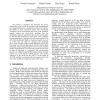Free Online Productivity Tools
i2Speak
i2Symbol
i2OCR
iTex2Img
iWeb2Print
iWeb2Shot
i2Type
iPdf2Split
iPdf2Merge
i2Bopomofo
i2Arabic
i2Style
i2Image
i2PDF
iLatex2Rtf
Sci2ools
114
click to vote
IEEEPACT
2003
IEEE
2003
IEEE
Reducing Datapath Energy through the Isolation of Short-Lived Operands
We present a technique for reducing the power dissipation in the course of writebacks and committments in a datapath that uses a dedicated architectural register file (ARF) to hold committed values. Our mechanism capitalizes on the observation that most of the produced register values are short–lived, meaning that the destination registers targeted by these values are renamed by the time the results are written back. Our technique avoids unnecessary writebacks into the result repository (a slot within the Reorder Buffer or a physical register) as well as writes into the ARF by caching (and isolating) short–lived operands within a small dedicated register file. Operands are cached in this manner till they can be safely discarded without jeopardizing the recovery from possible branch mispredictions or reconstruction of the precise state in case of interrupts or exceptions. The power/energy savings are validated using SPICE measurements of actual layouts in a 0.18 micron CMOS process...
| Added | 04 Jul 2010 |
| Updated | 04 Jul 2010 |
| Type | Conference |
| Year | 2003 |
| Where | IEEEPACT |
| Authors | Dmitry Ponomarev, Gurhan Kucuk, Oguz Ergin, Kanad Ghose |
Comments (0)

